The Search for God Page 2.1.4.1
What does it mean to be human? Philosophers, poets, and writers have struggled and discussed this for centuries. While we know many things about ourselves, there are many more things we don’t know.
It wasn’t until 60-70 years ago that we even knew the language of our own cells, DNA. Much of what we discuss are the intangible things of humanity: love, desire, the mind, from where do they arise?

Is there some immaterial spirit that lives inside us? The problem? We lack knowledge. Still, I want to touch on four subjects that we will continue to revisit during this search for the being we call God.
Abstract Thought
This human feature allows us to consider, imagine, formulate, and plan ideas and concepts that are not immediately available to our five senses. Abstract thought is what allows us to build buildings, vehicles, monuments, and more. Sure, birds may build nests and beavers dams.
But you don’t suddenly see a beaver build the hoover dam or birds construct nests with indoor plumbing. These creatures don’t write knowledge down, taking verbal communication and creating a written language and repositories of knowledge in books or the internet.
Just the fact that I communicate with individuals I have never met through this medium is a testament to such an amazing ability. Then we take this knowledge and contemplate other ways to communicate.
Creativity
How is creativity different from abstract thought? As my son reminded me while I was brainstorming, creativity often combines emotions. We take something like a blank sheet of paper, then imagine and envision some image upon the canvas.
We then pour into such an endeavor, a passion, joy, or anger, trying to invoke some response in another human. Many of the articles I write take abstract thought and concepts, then attempt to influence your heart, that term ancient philosophers used to represent the seat of emotions.
We might see animals with what appears to be emotions, but we don’t see that combination of emotions producing some long-term change through art, writing, or sculpture. Where does this come from? Is there some combination of genes that would allow all creatures to do this? Maybe.
Even my consideration of such possibility of bringing into reality something that does not currently exist is an example of creativity and abstract thought. Is this what God did?
Moral Standards
While abstract thought and creativity are tools humans use to produce such great works, moral standards are another intangible outworking of abstract thought where we consider how the world ought to be structured and how humans ought to treat one another.
This “oughtness” will be considered in the next article. We take abstract thought and our emotions and then develop an idea of right and wrong behavior in the real world.
Much of the wars and battles in human history have been over ideas and such abstract concepts as money and property. What is mine, is mine and what is yours, maybe I can have! Desire, lust, envy; these are concepts we all share.
When we debate assisted suicide or elective abortion, we consider what it means to be human. Can we treat other humans who currently do not display these abilities differently? Where are our individual moral lines in the sand?
Belief
Belief is an interesting topic, so much so that I devoted a few articles to the subject. Belief is like trust. Every human has beliefs. Even if I don’t trust any one person, belief supersedes persons or institutions. We have belief in ourselves, in the wind, and in the fact, that the sun will rise tomorrow.
Belief is an amalgamation of experience, thoughts, emotions, moral standards, and everything we think we know. What do you think will happen after we die?
Belief. Why did that person shoot a school full of children? You take your worldview, and what you think you know to be true, and develop a theory or belief.

What we should be considering is:
This is an appropriate time to take an emotional inventory. What do you already believe about God? Religion? Humans? During much of my journey searching for God, I tried to stay very logical; examining abstract beliefs, but did not explore the emotional and moral standard beliefs until confronted by them. What these religions said about human behavior. Why? There is something that lies at the root of the discussion.
Autonomy
Many people state that humans are free moral agents, “Give me liberty or give me death.” In some sense, we despise authority; we dislike commands that you “must,” you “ought.” We place ourselves under authority at a job, in the military, but at any moment, we know we can walk away.
To maintain our personal liberty, many people will risk imprisonment and even death. There are very few humans that will submit their will, being, and trust, fully to another human being. But what about an all-knowing, all-powerful, all-good, eternal being? Rebellion and submission.
Do we believe such a being exists? Do we trust such a being? Maybe we’re being fooled? Most people say, “No, it’s better to trust myself and do what I desire and perform what I can control rather than follow another being.” Unless we somehow benefit from following another.
The root of human interactions and autonomy is pride. The “self.” The “I.” We realize deep down that if we acknowledge this being, God, then we should submit. But we don’t want to.
We are the two-year child flopping on the floor, pounding our fists, crying, throwing a temper tantrum, and demanding what we desire. If this being, God, exists, we’re like a two-year-old in our knowledge and understanding of the universe. Who do we listen to, ourselves or our parental Creator?
What Next?
- What is the crucial concept?
- Human beings exhibit more than just physical traits, but immaterial processes that influence the world around us.
- Why is that significant?
- These immaterial concepts, suggest an immaterial cause.
References And Links
How Belief Systems Work
- Reno Gazette Journal – What does it mean to be human
- Plato Stanford – Human Nature

Leave a Reply